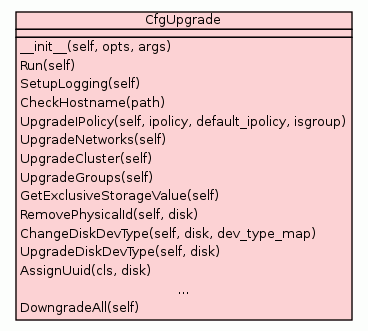
| Trees | Indices | Help |
|
|---|
|
|

|
|||
|
|||
|
|||
|
|||
|
|||
|
|||
|
|||
|
|||
|
|||
|
|||
|
|||
|
|||
|
|||
|
|||
|
|||
|
|||
|
|||
|
|||
|
|||
|
|||
|
|||
|
|||
|
|||
|
|||
|
|||
|
|||
|
|||
|
|||
|
|||
|
|||
|
|||
|
|||
|
|||
|
Inherited from |
|||
|
|||
|
|||
|
|||
|
|||
|
|||
|
|||
|
|||
|
|||
|
|||
|
|||
|
Inherited from |
|||
|
|||
x.__init__(...) initializes x; see help(type(x)) for signature
|
Ensures hostname matches ssconf value.
|
|
|
|
Return a conservative value of the exclusive_storage flag. Return |
Replaces disk's dev_type attributes according to the given map. This can be used for both, up or downgrading the disks. |
Upgrades the instances' configuration.
|
|
|
|
|
Upgrades the disks as config top level citizens.
|
|
Specify the nodes from which a disk is accessible in its definition. For every disk that is attached to an instance, get the UUIDs of the nodes that it's accessible from. There are three main cases: 1) Internally mirrored disks (DRBD): These disks are accessible from two nodes, so the nodes list will include these. Their children (data, meta) are also accessible from two nodes, therefore they will inherit the nodes of the parent. 2) Externally mirrored disks (Blockdev, Ext, Gluster, RBD, Shared File): These disks should be accessible from any node in the cluster, therefore the nodes list will be empty. 3) Single-node disks (Plain, File): These disks are accessible from one node only, therefore the nodes list will consist only of the primary instance node.
|
| Trees | Indices | Help |
|
|---|
| Generated by Epydoc 3.0.1 on Mon Aug 22 11:13:35 2016 | http://epydoc.sourceforge.net |